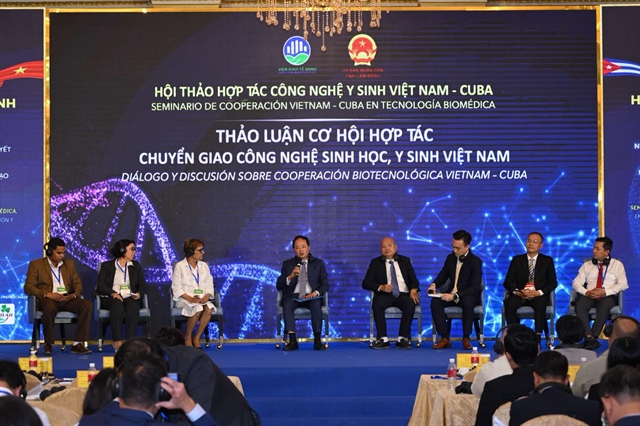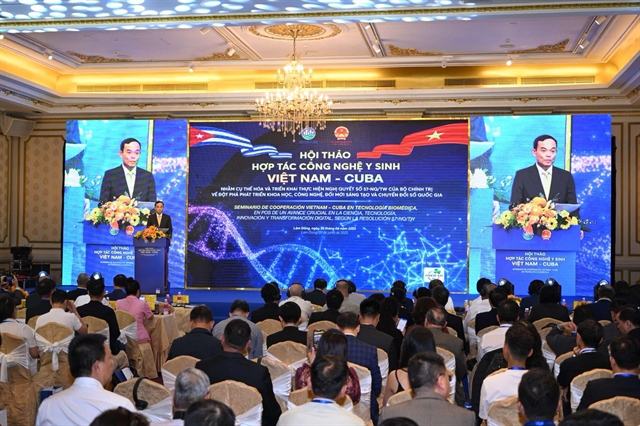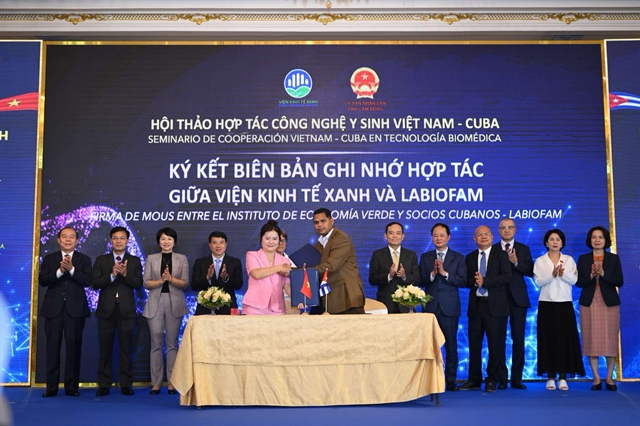 Society
Society

 |
| Panellists discuss opportunities for biomedical technology cooperation between Việt Nam and Cuba. — Photo courtesy of the organiser |
LÂM ĐỒNG — Vietnamese and Cuban scientists and policymakers discussed opportunities for biomedical technology cooperation at a workshop in Lâm Đồng Province on June 28.
The event was jointly organised by the Lâm Đồng Provincial People's Committee and the Green Economy Institute (GEI) to concretise and implement the Politburo’s Resolution 57-NQ/TW on breakthroughs in science, technology development, innovation and national digital transformation.
The workshop brought together more than 200 experts, scientists, representatives of leading agencies, organisations and businesses from Việt Nam and Cuba in the biomedical field.
The workshop served as a forum to discuss cooperation, promote technology transfer, exchange experts and develop applied products based on inventions, patents and technical solutions with commercialisation potential from Cuban scientists, such as treatment of cancer, stroke and diabetes, as well as public healthcare and high-tech agriculture.
Resolution 57 has identified science, technology, innovation and digital transformation as key driving forces and inevitable paths to bring Việt Nam rapid and sustainable development in a new era. The resolution also particularly emphasises the development of spearhead high-tech industries, including key areas like biotechnology and especially biomedical technology.
 |
| Secretary of the Party Central Committee and Head of the Central Policy and Strategy Commission Trần Lưu Quang speaks at the workshop. — Photo courtesy of the organiser |
Speaking at the workshop, Secretary of the Party Central Committee and Head of the Central Policy and Strategy Commission Trần Lưu Quang highlighted advanced biomedical technology as one of 11 strategic technology priorities for Việt Nam.
Cuba has become a successful model of innovation in the field of advanced biomedical technology, successfully building a complete, international biotechnology ecosystem with autonomy from research and development to production and commercialisation, according to Quang.
“Today's workshop is an opportunity for us to thoroughly discuss the potential for cooperation between the two countries, the mechanisms and conditions necessary to establish and operate a Việt Nam - Cuba Biomedical Technology Cooperation Centre located in Lâm Đồng. I believe that the centre will be the nucleus to form a complete biotechnology ecosystem, not only serving the two countries but also replicating the cooperation model with other international partners,” Quang said.
According to the deputy secretary of the Provincial Party Committee and chairman of the People's Committee of Lâm Đồng Province, Trần Hồng Thái, Lâm Đồng will create a favourable investment environment with specific policies to attract Cuban and Vietnamese enterprises to invest in the province.
“Cooperation with Cuba, a country with leading global biomedical technology, is the first strategic step in this roadmap. Lâm Đồng is committed to accompanying domestic and foreign partners to develop biotechnology into a new spearhead industry of national and regional significance,” Thái said.
Việt Nam is currently the third-largest Asian trading partner of Cuba. The two countries have untapped potential and investment opportunities, such as processing of agricultural products and food, consumer goods, and many other items.
Consul General of the Republic of Cuba in HCM City Ariadne Feo Labrada said that Cuba has a high level of development in biotechnology, biomedicine, medicine and pharmaceutical production, both in the fields of human and animal health care, as well as in agricultural production.
Labrada also confirmed that Cuba will work closely with Vietnamese authorities, organisations, governments and the business system to bring and transfer technology and experience in biomedical and biotechnology products to Việt Nam.
At the workshop, experts and businessmen from Việt Nam and Cuba shared opportunities and challenges in cooperation to transfer and apply biotechnology.
They said that biomedical technology and biotechnology are important foundations in developing a sustainable green economy, in line with the orientation of the Party and Government. They also introduced products and technologies for treating cancer, stroke and diabetes, as well as for community health care and high-tech agriculture.
 |
| Representatives of GEI and the Labiofam Group (Cuba) signed a comprehensive cooperation agreement at the workshop. — Photo courtesy of the organiser |
Within the framework of the workshop, the GEI and Cuba's Labiofam Group signed a comprehensive cooperation framework agreement on joint research, development, production and trade of agricultural biotechnology, natural medicine products and research projects to serve people's healthcare needs and sustainable agricultural development.
The GEI also signed an MoU on comprehensive cooperation with the Centre for Genetic Engineering and Biotechnology on cooperation in research, development, production and trade of agricultural biotechnology products and research projects, notably vaccines for livestock, poultry, aquatic animals and biological food preservation products.
Lâm Đồng currently has 1,247 species of plants with medicinal value, accounting for nearly 40 per cent of the total number of medicinal species in the country. The province’s Langbiang Biosphere Reserve was recognised by UNESCO in 2015 as one of the most important biodiversity conservation centres in Việt Nam and Southeast Asia, a place to preserve the rare genes of many medicinal species with high economic value. — VNS




